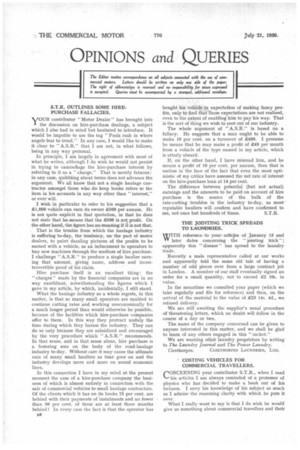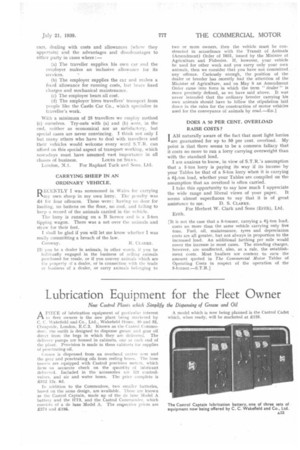OPINIONS and QUERIES The Editor invites correspondence on all subjects
Page 42

Page 43

If you've noticed an error in this article please click here to report it so we can fix it.
connected with the We of commercial motors. Letters should be satinets on only one side of the paw. The right of abbreviation is reserved and no responsibility for views xpremed is accepted. Queries must be accompanied by a stamped, addressed envelope.
S.T.R. OUTLINES SOME HIREPURCHASE FALLACIES.
TOUR contributor " Motor Dealer" has brought into the discussion on hire-purchase dealings, a subject which I also had in mind but hesitated to introduce. It would be impolite to use the tag "Fools rush in where angels fear to tread." In any case, I would like to make it clear to " A.S.R." that I am not, in what follows, being in any way personal.
In principle, I am largely in agreement with most of what he writes, although I do wish he would not persist in trying to camouflage the hire-purchase interest by referring to it as a "charge." That is merely fatuous : in any case, quibbling about terms does not advance the argument. We all know that not a single haulage contractor amongst those who do keep books refers to the item in his accounts in any way other than " interest," or ever will.
I wish in particular to refer to his suggestion that a £1,000 vehicle can. earn its owner £.500 per annum. He is not quite explicit in that quotation, in that he does not state that he means that the £500 is net profit On the other hand, the figure has no meaning if it is not that.
That is the trouble from which the haulage industry is suffering to-day, the tendency, on the part of motor dealers, to paint dazzling pictures of the profits to be earned with a vehicle, as an inducement to operators to buy new machines through the medium of hire purchase. I challenge " A.S.R." to produce a single haulier earning that amount, giving name, address and incontrovertible proof of his claim.
Hire purchase itself is an excellent thing : the "charges" made by the financial companies are in no way exorbitant, notwithstanding the figures which I gave in my article, by which, incidentally, I still stand.
What the haulage industry as a whole regrets, in this matter, is that so many small operators are enabled to continue cutting rates and working uneconomically for a much longer period than would otherwise be possible, because of the facilities which hire-purchase companies offer to them. In this way they protract unduly the time during which they harass the industry. They can do so only because they are subsidized and encouraged by the very procedure which " A.S.R." recommends. In that sense, and in that sense alone, hire purchase is a festering sore on the body of the road-haulage industry to-day. Without care it may cause the ultimate ruin of many small hauliers as time goes on and the industry develops more and more on sound economic lines.
In -this connection I have in my mind at the present moment the case of a hire-purchase company the business of which is almost entirely in connection with the sale of commercial vehicles to small haulage contractors. Of the clients which it has on its books 75 per cent, are behind with their payments of instalments and no fewer than 50 per cent, of them are at least three months behind ! In every case the fact is that the operator has
s8 bought his vehicle in expectation of making fancy profits, only to find that those expectations are not realized, even to the extent of enabling him to pay his way. That is the sort of thing we wish to root out of our industry.
The whole argument of " A.S.R." is based on a fallacy. He suggests that a man ought to be able to make 10 per cent. on a turnover of £480. I presume be means that he may make a profit of £48 per month from a vehicle of the type named in my article, which is utterly absurd.
If, on the other hand, I have misread him, and he means a profit of 10 per cent, per annum, then that is useless in the face of the fact that even the most optimistic of my critics have assessed the net rate of interest on the hire-purchase loan at 14 per cent.
The difference between potential (but not actual) earnings and the amounts to be paid on account of hire purchase is the source of the bulk of the rate-cutting troubles in the industry to-day, as most ' reputable hauliers will confirm and have confirmed to me, not once but hundreds of times. S.T.R.
THE JOINTING TRICK SPREADS TO LAUNDRIES.
WITH reference to your articles of January 13 and TT later dates concerning the "jointing trick "; apparently this " disease " has spread to the laundry trade.
Recently a male representative called at our works and apparently told the same old tale of having a number of odd pieces over from a large contract job in London. A member of our staff eventually signed an order for a small quantity, not to exceed £2 10s. in value.
In the meantime we consulted your paper (which we take regularly and file for reference) and then, on the arrival of the material to the value of £23 14s. 4d., we refused delivery.
We are still awaiting the supplier's usual procedure of threatening letters, which no doubt will follow in the course of a day or two.
The name of the company concerned can be given to anyone interested in this matter, and we shall be glad to learn of any others engaged in this "racket."
We are warning other laundry proprietors by writing to The Laundry Journal and The Power Laundry.
Cleethorpes. CLEETHORPES LAUNDRIES, LTD.
' COSTING VEHICLES FOR COMMERCIAL TRAVELLERS.
CONCERNING your contributor S.T.R., when I read Ia.' his articles I ant always reminded of a protessor of physics who has decided to make a. book out of his lectures. I envy his knowledge of his subject as much as I admire the reasoning clarity with which he puts it over.
What I really want to say is that I do wish he would give us something about commercial travellers and their cars, dealing with costs and allowances (where they appertain) and the advantages and disadvantages to either party in cases where :— (a) The traveller supplies his own car and the employer makes an inclusive allowance for its services.
(b) The employer supplies the car and makes a fixed allowance for running costs, but bears fixed charges and mechanical maintenance.
(c) The employer bears all cost.
(d) The employer hires travellers' transport from people like the Castle Car Co., which specialize in traveller's work.
With a minimum of 25 travellers we employ method (c) ourselves. Try-outs with (a) and (b) were, in the end, neither as economical nor as satisfactory, but special cases are never convincing. I think not only I but many others who have to deal with travellers and their vehicles would welcome every word S.T.R. can afford on this special aspect of transport working, which nowadays must have assumed vast importance in all
classes of business. Lours DE SI LV A .
London, N. 1. For Raphael Tuck and Sons, Ltd.
CARRYING SHEEP IN AN ORDINARY VEHICLE.
RECENTLY I was summoned in Wales for carrying ‘my own sheep in my own lorry. The penalty was £4 for four offences. These were : having no door for loading, no battens on the floor, no roof, and failing to keep a record of the animals carried in the vehicle.
The lorry is running on a B licence and is a 2-ton tipping wagon. There was a net over the animals and sti nw for their feet.
I shall be glad if you will let me know whether I was really committing a breach of the law.
Conway. R. CLARKE.
[If you be a dealer in animals, in other words, if you be habitually engaged in the business of selling animals purchased for resale, or if you convey animals which are
the property a dealer, or in connection with the trade or business of a dealer, or carry animals belonging to
two or more owners, then the vehicle must be constructed in accordance with the Transit of Animals (Amendment) Order of 1031, issued by the Minister of Agriculture and Fisheries. If, however, your vehicle be used for other work and you carry only your own animals, then we consider that you have not committed. any offence. Curiously enough, the position of the dealer or breeder has recently had the attention of the Minister of Agriculture, and on May 8 an Amendment Order came into force in which the term " dealer." is more precisely defined, as we have said above. It was never intended that the ordinary breeder carrying his own animals should have to follow the stipulation laid down in the rules for the construction of motor vehicles used for the conveyance of animals by road.—En.]
DOES A 50 PER CENT. OVERLOAD RAISE COSTS?
I AM naturally aware of the fact that most light lorries
are guaranteed for up to 50 per cent. overload. My point is that there seems to be a common fallacy that it costs no more to run a lorry carrying overweight than with the standard load.
I am anxious to know, in view of S.T.R.'s assumption that a 5-ton lorry is paying its way if its income by your Tables be that of a 5-ton lorry when it is carrying a 6i-ton load, whether your Tables are compiled on the assumption that an overload is often carried,
I take this opportunity to say how much I appreciate the wide range and liberal views of your paper. It seems almost superfluous to say that it is of great
assistance to me. D. S. CLARKE,
For Herbert W. Clark and Sons (Erith), Ltd.
Erith.
[It is not the case that a 5-tanner, carrying a 6i-ton load, costs no more than the same vehicle carrying only five tons. Fuel, oil, maintenance, tyres and depreciation costs arc all greater, but not always in proportion to the increased load. An additional farthing per mile would cover the increase in most cases. The standing charges, however, are unaffected, also, as a rule, the establishment costs. Most hauliers are content to earn the amount quoted in The Commercial Motor Tables of Operating Costs in respect of the operation Of the 5-tonner.—S.T.R.]












































































